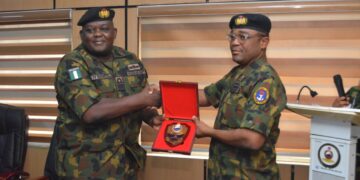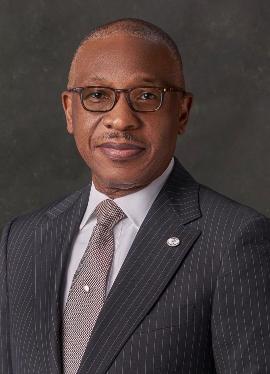Welcome to this edition of ‘CEOs Talk Business.’
The Chief Executive Officer of Ocean Pearl Maritime, Marine Engineer, Emmanuel Ilori, bares it all that without a maritime technical development programme in place in Nigeria, solutions to many technical demands for industry growth would remain a mirage. He shares insights on what these gaps are as he points out the huge economic benefits of fully utilising the inland waterways.
Transcription
What kinds of capacity development does the maritime industry in Nigeria needs for desired growth?
If you liken the maritime industry with the Aviation Industry, because they are almost parallel industries, and they have identical technical governance structure. And if you think of the capacity development in the aviation industry, it also mirrors the maritime industry, the only difference is that the maritime industry is slightly older than the aviation industry in Nigeria. So, when I say it is a bit broad, it is in that context.
The Aviation Industry had similar challenges to the maritime industry, but for some reason they were able to at least overcome the challenges. Therefore, if you say where we begin to address the challenges, I think we need to draw a parallel from the aviation industry, how they were able to do it. For instance, Nigeria invested in Nigerian Airways, we had planes, the planes disappeared. Think of the capacity that we developed for the Nigerian Airways. We developed similar capacity for the maritime industry. For the Aviation Industry today, the human technical capacity that they developed had been able to go back to run the aviation industry because, these are people who understand the rules and things like that. But, it is not replicated in the maritime industry, so you cannot expect the maritime industry to be able to respond to the challenges of the maritime industry by people who do not understand the technical needs of the maritime industry. Therefore, the maritime sector is at a disadvantage.
Now, we want to talk about the infrastructure, the decision-making process and all those things. You cannot expect somebody who does not have the technical understanding of what he is looking at to be able to take that sort of decision. They will be seeking for “advise me this, who will tell me this, who will tell me that.” And at the end of the day, he is going to base his decision on what suits him, and may not necessarily be what suits the industry.
Take for instance when we were having crashes in the Nigerian Aviation Sector, they brought in the experts, and say wait a minute, what are we going to do about this? Those who were able to take decisions to guide the government were actually those who were in that sector. They have a civil aviation person who understands the sector. They have a regulation person who understands the sector, and so on and so forth. And they were able to turn the aviation sector around. And Nigeria now sits on ICAO (International Civil Aviation Organisation), and that is the highest ruling body of the aviation sector. That is not the same thing in the maritime sector.
We were thrown out of IMO Council many years back. Let me take that as an example. When we were going to the IMO Council, I think 2009, we made some technical promises to the global community, and because the global community saw the technical potential in Nigeria, they were able to readmit Nigeria with the understanding that all these technical promises that you made regarding the technical development of the Nigerian maritime sector, you will keep to your word. Of course, Nigeria did not keep to its word about the maritime technical development, and then nobody wants to deal with Nigeria.
So, going back, if you want to attain those heights again, we need to look at the technical development of the Nigeria maritime sector, have the technical people there to run those institutions or at least to be in a position to make input to the decision-making process, so that we can then begin to put a technical roadmap in place.
What should the nation be doing to build the capacity to meet the demand for the maritime sector?
One of the promises that Nigeria made was to have a Nigerian maritime technical development programme or an initiative. It is one of the promises that we made to the global body that Nigeria will have a maritime technical development programme in place. So, once you put a maritime technical development programme in place, people will know how to engage with you, people will know what your needs are , people will know what resources you need, people will know what support you need. Nations that have done that, they are going up in leaps and bounds. Take for instance, Turkey had a similar maritime technical development programme, look at where they are today. Malaysia had a maritime technical programme in place manned by competent technical people who were able to advice their government, look at where they are today, China ditto. And the other nations, ditto. And Nigeria has the potential, not by our population or our economy, but by our remoteness because, we are not in an area where we will be competing with anybody directly for the maritime sector. We are remote from Europe, remote from China. So, if we even develop our own maritime technical sector, we will be the kings of our own palace. Nobody is here, in the region to compete.
What key areas should such technical programme be looking at?
Yes. Let us take for instance, Nigeria has a population of about 200 million people, and we are dependent upon import and export, we are oil-dependent. Are we not? So, the oil sector is still driven by resources, water-based resources that is not technically available in Nigeria. We can go on for the very long list of what is involved. Ok, NCDMB is trying a little bit in this area but, it is just a drop in the ocean.
So, we need to have a holistic maritime technical development. That is in terms of the oil sector. The biggest sector that we have not addressed, because we seem to be focusing on import-export. The biggest sector that we have not addressed, look at the population of Nigeria, because we are spending huge amounts on road development. We are developing cities around our roads.
Ten thousand kilometres of water that is within the nation, and we are not developing it. China developed itself around its inland waterways system, UK, ditto. Countries that do not have the inland waterways system, what did they do? They even open their land to have water to develop their economy because, it is easier, more economical, more efficient to move more goods using the water. That is how we can look at it.
When the White men came to Nigeria, what did they do? They landed in Lagos and used our waterways to develop Nigeria. Is it not true? They came in, and then looked at the waterways up to Lokoja, and they were able to open up to Niger, up to Onitsha.
So, they were able to open Nigeria, and were able to make their work relatively easier. They only added railways later to improve things. They added the small road networks, but they were able to move the heavy goods through the water. But now, we are not. We are building cities around our road network. We are congesting the road network, it is no more efficient.
We are making our road network unsafe, we are creating hazards for ourselves. You can look at the myriad of problems, whereas if we go to the utilisation of God-given gift of the inland waterways network, look at where Nigeria will be today. Even in terms of property development, in developed areas properties along the rivers are probably most expensive, but at the moment we are not even thinking of that.
Take Lagos for example, Lagos is suddenly congested whereas we have a huge network of waters that we can put those goods into and then we can begin to make Nigeria prosperous, and we are saying Nigeria is not prosperous? Whereas we are sitting hugely on billions of Dollars, simply because we are not using our technically competent developed people to help to drive these various initiatives.
#AtTheMarinaToday, #MaritimeRealityCheck
































































